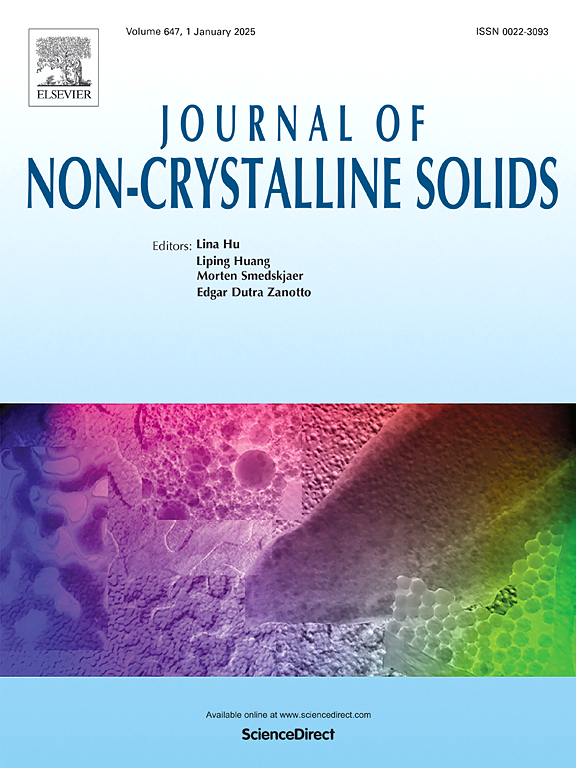Molecular dynamics simulation of shock-induced plastic deformation and spallation behavior of Cu/Cu64Zr36 crystalline/amorphous composites
IF 3.2
3区 材料科学
Q1 MATERIALS SCIENCE, CERAMICS
引用次数: 0
Abstract
Molecular dynamics (MD) simulations were performed to study the shock-induced plastic deformation and spallation failure of Cu/Cu64Zr36 crystalline/amorphous composites with a pre-existing void. The results show that the pre-existing void collapses always perpendicular to the direction of the shock loading, regardless of whether the shock direction starts from the crystalline phase or the amorphous phase. The Cu/Cu64Zr36 composites are more prone to spallation failure when the shock starts from the Cu crystalline phase. The changes of dislocation density and shear transformation zone (STZ) activation are closely related to the magnitude and direction of shock velocity. When the shock velocity reaches 2.0 km/s, dislocations in the crystalline phase disappear, dislocation density is close to zero and STZs activate throughout the entire amorphous phase. In addition, regardless of the shock velocity and direction, no shear bands are generated in the Cu/Cu64Zr36 composites under shock loading, which is significantly different from the case of tensile loading.
冲击诱导的 Cu/Cu64Zr36 结晶/非晶态复合材料塑性变形和剥落行为的分子动力学模拟
我们进行了分子动力学(MD)模拟,以研究带有预存空隙的 Cu/Cu64Zr36 结晶/非晶态复合材料的冲击诱导塑性变形和剥落破坏。结果表明,无论冲击方向是从晶体相还是非晶相开始,预先存在的空隙总是垂直于冲击加载方向坍塌。当冲击从 Cu 结晶相开始时,Cu/Cu64Zr36 复合材料更容易发生剥落破坏。位错密度和剪切转变区(STZ)活化的变化与冲击速度的大小和方向密切相关。当冲击速度达到 2.0 km/s 时,结晶相中的位错消失,位错密度接近于零,STZ 在整个非晶相中激活。此外,无论冲击速度和方向如何,Cu/Cu64Zr36 复合材料在冲击加载下都不会产生剪切带,这与拉伸加载的情况明显不同。
本文章由计算机程序翻译,如有差异,请以英文原文为准。
求助全文
约1分钟内获得全文
求助全文
来源期刊

Journal of Non-crystalline Solids
工程技术-材料科学:硅酸盐
CiteScore
6.50
自引率
11.40%
发文量
576
审稿时长
35 days
期刊介绍:
The Journal of Non-Crystalline Solids publishes review articles, research papers, and Letters to the Editor on amorphous and glassy materials, including inorganic, organic, polymeric, hybrid and metallic systems. Papers on partially glassy materials, such as glass-ceramics and glass-matrix composites, and papers involving the liquid state are also included in so far as the properties of the liquid are relevant for the formation of the solid.
In all cases the papers must demonstrate both novelty and importance to the field, by way of significant advances in understanding or application of non-crystalline solids; in the case of Letters, a compelling case must also be made for expedited handling.
 求助内容:
求助内容: 应助结果提醒方式:
应助结果提醒方式:


